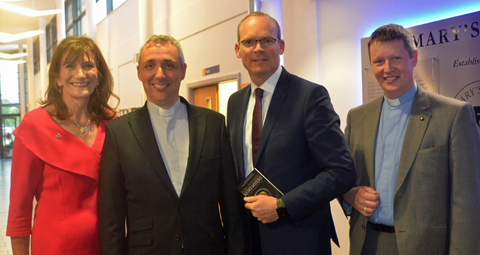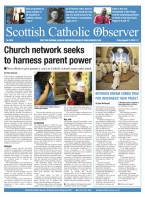July 21 | ![]() 0 COMMENTS
0 COMMENTS ![]() print
print

FORGIVE AND REMEMBER
AMANDA CONNELLY talks to a Catholic priest and a Church of Ireland archdeacon whose new book offers a route to peace
EVERY time we switch on the news, the world looks a little darker. Terror attacks, war zones and human rights breaches flood our press and media coverage and people respond to anger and fear with more anger and fear.
Hostility and suspicion seem to be the spirits of the age when building bridges and reconciliation are needed now more than ever.
Enter Fr Paul Farren and Archdeacon Robert Miller, friends from neighbouring Northern Irish parishes of different denominations on the edge of the Bogside in Derry—one Catholic, one Church of Ireland—who are tackling peace-building and forgiveness, one chapter at a time.
Fr Farren and Archdeacon Miller have come together to pen Forgiveness Remembers, a book that ‘has the potential to lead us out of the darkness of hate and into the light of peace.’
Drawing on the personal experiences of both authors and that of their respective communities, it touches on subjects that are perhaps all too well known in Northern Ireland’s troubled history.
Navigating hate, pity, compassion, forgiveness, grace, peace and hope, it’s hoped the book can help those within nations dealing with the burden of ‘unforgivingness’ and in the smaller everyday matters too.
“In the reality that we live in today, the often painful journey of forgiveness is the only key to a future of freedom and peace,” Fr Farren said.
The book was born from a friendship between the two clergymen, and has grown over the years.
“I had been here just a year before, and when Fr Paul arrived, he came over and introduced himself, and that began a friendship,” Archdeacon Miller said. “We began to talk obviously about the situation in North Ireland, and our churches have quite a good relationship and we continued to develop that.
“It’s grown really quite a lot, to the point that in the Year of Mercy the Roman Catholic bishop began the year in my church with my congregation across the road, and then we all came across to St Eugene’s Cathedral, and I think it’s fair to say that’s kind of normal.
“So the book in some ways grew out of the situation we live in, in Northern Ireland, but really we wanted it to be about forgiveness in the small, ordinary things.”
With their respective churches located in such a well-known location, the idea of forgiveness is one that cannot be ignored—both in their local communities and nationally.
The Troubles and the social and political devastation they caused in Ireland (not to mention in other countries with populous numbers of Irish Catholics and Protestants, such as Scotland’s west coast), is not one that can be easily erased from many memories.
Divisions remain even today to some extent, and the wrongs committed cannot always be so readily forgiven.
Stemming from the national, social and political climate in which both men of God lead their congregations, and in which their friendship has blossomed, it proved an excellent springboard for a work that aims to address the idea of forgiveness from the context of Northern Ireland, but for the everyday.
“I think one of the other things is that we can do nice things together, and in Christian unity we can come together in nice prayer services and all of that, and even in Northern Ireland politicians can talk about sharing power or splitting power, and always they speak about the issues of the past and how we deal with the past,” Fr Farren said. “I think that we were clear very early on that forgiveness has to be part of any journey to peace—whether that’s a journey within a family, within a person in their own right, or within a community or a country.
“In Northern Ireland we can all just set up our communities. Even Catholic and Protestant: they’re kind of old-fashioned terms now. You have Nationalist, Republican, Loyalist and Unionist communities and we just live apart and we come together for nice events and then we go back to our communities.
“But if we engage in the concept of forgiveness, then what we’re saying in the book is we’re engaging in relationships; we’re actually getting to know the person who hurt us—and how do we do that?
“I suppose one of the main points the book makes is that forgiveness is a very difficult but necessary journey, and that forgiveness is ultimately a gift to the person who forgives, maybe even more so than to the person who has been forgiven. The person who forgives is free when they forgive and they’re not carrying that anger or that hatred or that bitterness with them all the time.”
Both men however note that forgiveness is at times a difficult and long journey, and wished for the book not to be a ‘10-step guide’ to forgiveness.
They spoke of the struggles that can be bound up with forgiveness and of ‘being gentle’ with oneself in the process, but honest too, as ‘we are unable to forgive until we actually acknowledge in ourselves the amount of hate, the amount of hurt, the amount of bitterness that we carry,’ and move forward from this.
Both authors acknowledge that they write from an Irish context, but that ‘forgiveness is required wherever there’s a division.’
“As Archdeacon Robert was saying, we seem now to define ourselves not as to who we are, but as to who we’re not, and forgiveness breaks down those issues,” Fr Farren said.
This idea of the ‘us versus them’ mentality is one that is predominant in today’s world—perhaps particularly with ongoing interfaith issues, and it is hoped the book can teach something of acceptance and encounter towards the ‘other.’
“The book really wants you to look at yourself and your own life,” Archdeacon Miller said. “Any of those things can fester and it’s not actually that big a step to then look at yourself within a society, because when you change a society, a society is a collection of people.
“It’s helping them to look at a fresh way of how do they relate when something goes wrong, and in a wider sense I think the big problems with society, the big challenges, is the cult of the individual.
“It’s all about my rights as an individual, and yet there is not an awful lot said about responsibility; there’s not an awful lot said about ‘yeah that’s my right, but I’m going to set that right to one side because that’s going to be better in terms of building community.’
“That’s where the sense of encounter comes through the book really quite strongly. It’s not a one size fits all: it’s offered as kind of a help on the journey.”
This encounter in our singular and everyday lives is where, Fr Farren notes, forgiveness begins on the wider scale.
“We can only call for forgiveness if we forgive, we can only call for peace if we make peace,” he said. “It all has to begin in me. I have to be the one who forgives, I have to be the one who encounters people who are different to me, I have to be the one who sees the Child of God in the person who causes terror.”
Forgiveness Remembers is ‘the story of a possible journey,’ that draws on the everyday and the historical, for a world that perhaps needs forgiveness more than ever.










